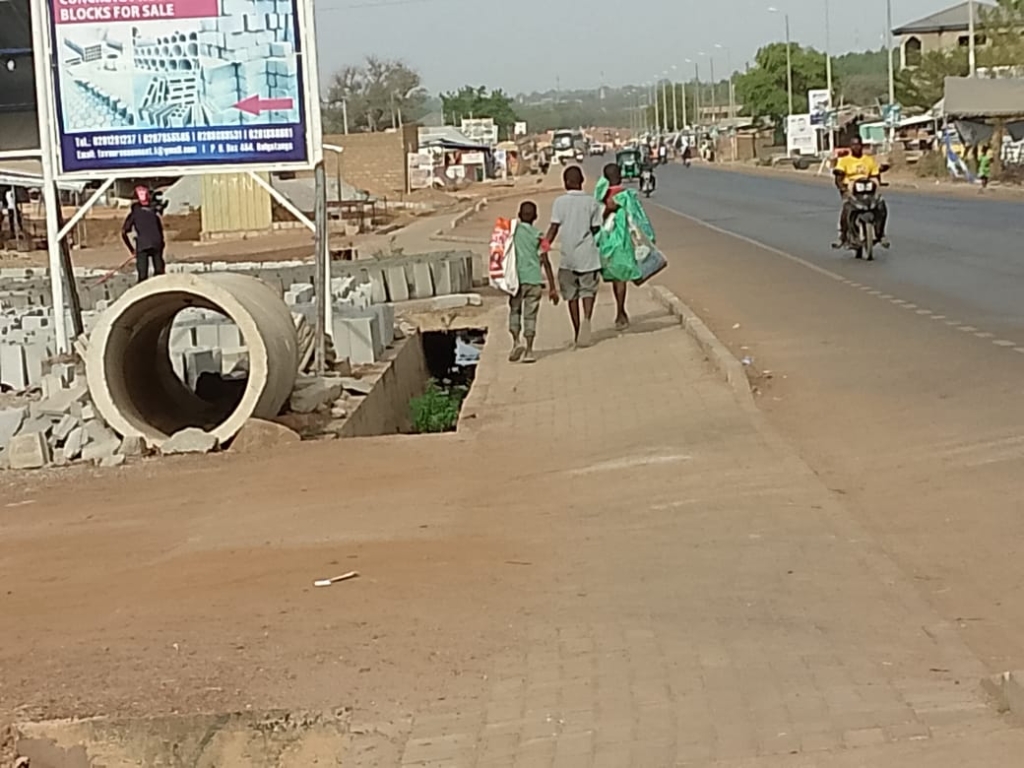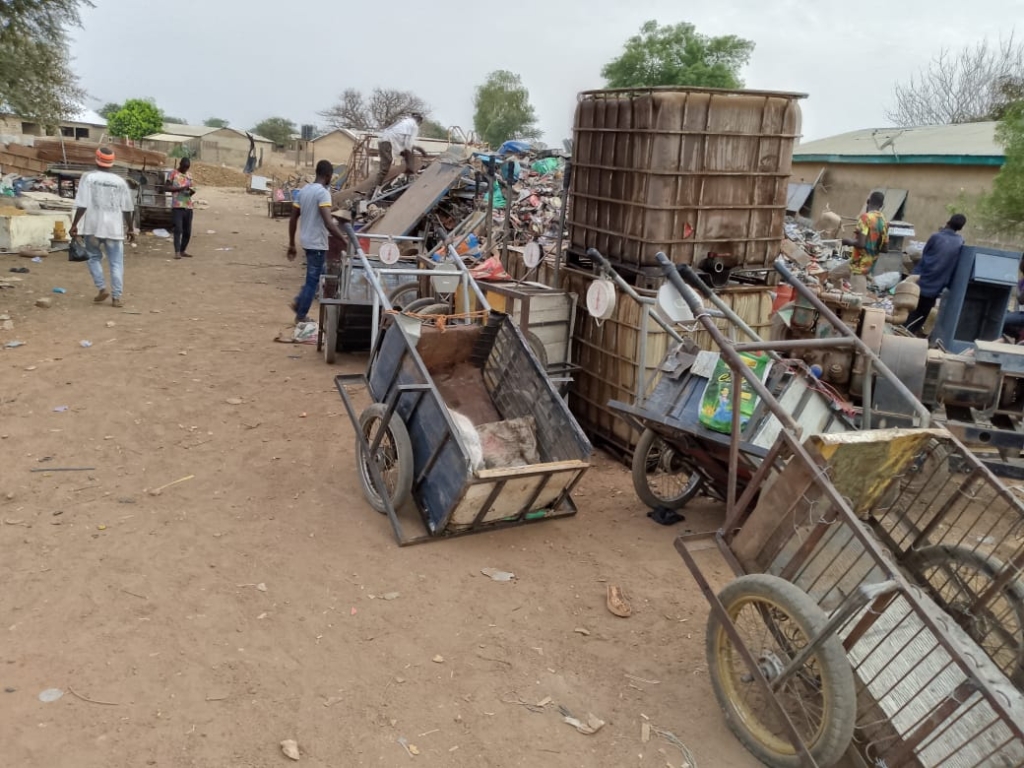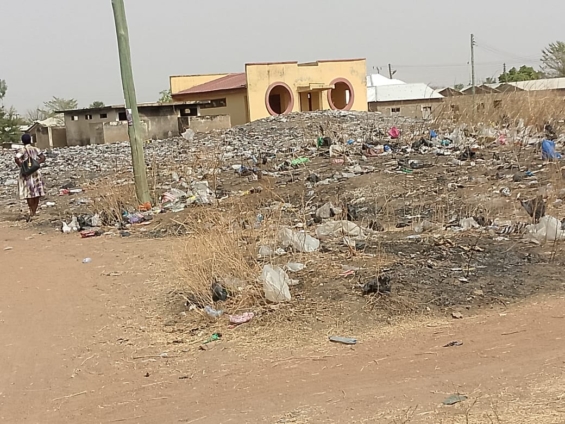
Audio By Carbonatix
Thirteen-year-old Mbabota and his younger siblings, aged 10 and seven years, scavenge every weekend on farmland and dumping sites at the Kumbosigo and Yarigabiisi communities in the Upper East Region when school is not in session, to collect waste plastics, sachets and metals.
This is a routine the three never get tired of despite Mbabota’s sore leg.
The leg became sore due to a cut he sustained from a previous escapade when a broken bottle on a farm cut him. The dusty bandage tied round his ankle does not deter him.
The waste plastics and scrap they collect include plates, cups, buckets and empty water bottles and sachets.
The children engage in this almost on daily basis to send to the scrap dealers, especially the one at the corner of the village, where the items are weighed, and payment made accordingly.
Plight of the Siblings
Mbabota, a primary six pupil, told the Ghana News Agency (GNA) that he used the proceeds to buy food and sometimes writing materials, especially exercise books, pens and pencils for school.
The involvement of children in such activities for money, though not new in the country, continues to expose them to health hazzards.
This action also exposes them to environmental harm, abuse of their rights. Their development is also impeded.

The Sustainable Development Goal-Three advocates ensuring healthy lives and promoting the well-being at all ages before 2030.
However, the story of the three siblings and many others is gaining momentum in most communities due to indiscriminate disposal of liter recently.
This growing phenomenon of plastic pollution in Ghana has been a teeth gnashing problem where a glance at the surroundings in most communities has become nauseating.
Yet it seems every government has thrown in the towel in finding a lasting solution to the problem, despite many political campaign pledges to rid the cities, towns and communities of filth.
Thus, the plastic menace has over the years become a persistent pollutant to the environment and a threat to life on earth and aquatic life.
However, the Sustainable Development Goal 14.1 advocates interventions to prevent both marine pollution of all kinds and land based activities that pollute the environment.
Political Pledges on Environment
President Nana Addo Dankwa Akufo-Addo, under the National Plastic Action Partnership (NPAP), pledged a new game changer in the country’s plastic management through the promotion of green alternatives to nurture and develop new business models for job creation throughout the value chain.
The Partnership also aims to develop systems and infrastructure across the country to ensure that the waste is turned into value added products.
With this partnership and collaborative work under its Global Plastic Action Partnership (GPAP), which aims to create a world free of plastic pollution, there should have been signs of improvement but this value addition targets are still farfetched.
Situation in the Communities
In every market and super-market in Ghana, apart from some products purely produced by the manufacturers with paper packages, most products are packaged in single-use plastics, ranging from kitchen ingredients to toiletries and drinking water.
The average Ghanaian comes into contact with all types of plastics often described as, “take away” on daily basis. At special occasions like funerals, outdooring, weddings and community durbars, plastics are commonly used to serve food and drinks.
Plastic bottles and sachet disposed of haphazardly, with some thrown out of moving vehicles, usually lodged in gutters and finally washed into the sea.
An environmental situation report by Interactive Country Fiches estimates that more than 3000 metric tonnes of plastic is generated daily, and one million tonnes generated yearly in Ghana.
An estimated 86 per cent of Ghana’s plastic waste load is improperly disposed of resulting in choked gutters, drains, rivers and streams.
The same report said an estimated 250,000 tonnes of plastic waste in Ghana were dumped into the Atlantic Ocean yearly.
Mr Pius Akambe, the Bolgatanga Municipal Environmental and Sanitation Officer, in an interview with the GNA, said reducing the volumes of plastic waste required sensitisation of the public on the harmful effects of the plastics on humans, animals, and the environment.
School children could also be targeted and educated on plastic pollution and can be agents of change for their peers and communities.
“Stopping the littering and pollution of the environment is a responsibility of all citizens because government and the assemblies cannot do it alone,” he said.
Recycling of Plastic Waste
The efforts to clear the environment of waste plastic, though might have been specified in the local content regulations of recycling plants, both for turning solid and liquid waste into reusable products, the five regions of the north are yet to make full use of the benefits from these industries concerning waste management.

In 2020, the ground was broken for one of such recycling plants at Sirigu in the Bolgatanga Municipality of the Upper East Region, but the project had stalled due to politicisation, which had bedevilled many other projects.
Implication for the five regions of the north
As farming hubs, the already changing weather patterns and poor soils are affecting food security while farmers are contending with the plastic menace as it contributes to poor plant growth and yield.
Plastic materials are not degradable and so are stuck in the soil preventing seed germination, while animal health is also impacted, as most of them died after feeding on leftover food contained in plastics, which get entangled in their digestive processes.
Challenges of Stakeholders in the Waste Material Business
Alhaji Mohammed Sule, a businessman, dealer of scraps and plastics in the Bolgatanga East District, reiterated the high cost of transportation of such scraps and plastics to Accra for recycling purposes.
According to him, a long vehicle conveying full load of scrap cost him between GH₵150,000 and GH₵200,000 to Accra.
He said buyers were more interested in scrap as compared to plastics, thereby making the plastic business not lucrative.
Recommendation
The plastic problem requires steadfast and consistent commitment by government and all stakeholders to achieve the desired change. Special initiatives should be established by the Government and the private sector to find nature-based solutions to dealing with plastic waste.
This is because millions of these plastics, both bag and bottles, are being produced every day with just a little of it being recycled.
This calls for a lifestyle change to end plastic pollution. There should be a complete rethinking and changing of attitudes towards production, usage, and disposal of plastics.
The producers and consumers must consider environmental health first as the only place for survival when dealing with the ‘‘use once and throw away plastics lifestyle’’, which is killing the environment.
The public should rather refuse non-essential plastics and promote re-use and refill practices.
Also, innovation, especially using local ecological materials, should be promoted to replace plastics while sound waste management must be enforced to prevent plastic waste from entering the environment.
All hands must be on deck as much would not be achieved if sections of the public transition while others continue their normal ways of plastic usage.
Latest Stories
-
Ghana is rising again – Mahama declares
4 hours -
Firefighters subdue blaze at Accra’s Tudu, officials warn of busy fire season ahead
5 hours -
New Year’s Luv FM Family Party in the park ends in grand style at Rattray park
5 hours -
Mahama targets digital schools, universal healthcare, and food self-sufficiency in 2026
5 hours -
Ghana’s global image boosted by our world-acclaimed reset agenda – Mahama
6 hours -
Full text: Mahama’s New Year message to the nation
6 hours -
The foundation is laid; now we accelerate and expand in 2026 – Mahama
6 hours -
There is no NPP, CPP nor NDC Ghana, only one Ghana – Mahama
6 hours -
Eduwatch praises education financing gains but warns delays, teacher gaps could derail reforms
6 hours -
Kusaal Wikimedians take local language online in 14-day digital campaign
7 hours -
Stop interfering in each other’s roles – Bole-Bamboi MP appeals to traditional rulers for peace
7 hours -
Playback: President Mahama addresses the nation in New Year message
8 hours -
Industrial and Commercial Workers’ Union call for strong work ethics, economic participation in 2026 new year message
10 hours -
Crossover Joy: Churches in Ghana welcome 2026 with fire and faith
10 hours -
Traffic chaos on Accra–Kumasi Highway leaves hundreds stranded as diversions gridlock
10 hours

